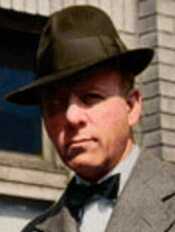The Evening Star (November 24, 1945)

Lawrence: Testimony on attack an old, sad story
Thesis that Roosevelt put U.S. into war is absurd
By David Lawrence
Testimony before the Pearl Harbor Committee in Congress merely accentuates details of a sad story already well known, namely, that the United States was unprepared for war against Japan, that Japan knew it and pressed her advantage.
The thesis that the late President Roosevelt dragged the nation into war with Japan or provoked it is made more and more absurd by the revelations. Mr. Roosevelt obviously was trying to stall the Japanese and had no reason to want them in the war, at least until Hitler was conquered by the Allies. America was unprepared for a two-ocean war because it had only a one-ocean Navy.
But it is also manifest that Mr. Roosevelt’s desire to aid the Allies caused him to send a substantial portion of our fleet to the Atlantic to care for possible emergencies there. He couldn’t tell from which side the attack might come first.
Whether Japan would or would not have turned her carrier fleet back early in December 1941 depended only on whether the United States would have yielded in the negotiations. Obviously to yield was to invite aggression later on and complicate America’s problems in the Pacific. So, it was always the United States which sought to prolong negotiations. If the November 26 note was an ultimatum, it was not intended to break off the negotiations, but to answer what the American government considered to be a previous ultimatum to us.
Debate called pointless
The debate as to who provoked the other is pointless because Japan saw her advantage the moment Europe became embroiled in war. She would gladly have abandoned her attack in 1941 if the United States had been willing to desert China and furnish oil and munitions to the Japanese Army and Navy to carry on aggression in Asia.
Looking back at the situation as it existed in 1941, the Washington government knew it was in a tight place, but couldn’t back away from it without getting into worse trouble.
But could the war with Japan have been avoided? The answer is that it might have been avoided if the United States pursued a friendlier policy toward Japan in the entire decade before 1941. There were times when the Japanese military party had less of a grip on the situation inside Japan than in 1940 or 1941. A sound policy of cultivating the liberal elements in Japan might have strengthened the peace party inside Japan. The damage was done much earlier than 1940 or 1941.
As for preparedness, the warnings of men like Adm. Taussig and Adm. Yarnell in 1940 were disregarded. Congress was never given a true picture of the dangers. The time to have done so was back in 1934 and 1935 when billions of dollars were being spent on WPA and leaf-raking which might better have been spent on armament.
There was a time back in 1940 when the Japanese liberals begged the American government to remove discriminations against the Japanese. The quota system would have permitted only a handful of Japanese immigrants to come in each year but denial of admission caused injury to the Japanese pride which was irreparable.
Cry of color line
This sort of thing gave the militarists their chief ammunition in Japanese politics – America was drawing the color line against all Asia. Such was the cry and with it went other charges of American interference with Japanese commercial opportunities. The documents covering the relations between Japan and the United States in 1930 and thereafter as published recently by the State Department tell the story of how nations become unfriendly with each other.
The time to prevent war is when the seeds of hate and friction are sowed in the first instance. Japanese militarism got the upper hand, saw Hitler start a war that almost conquered Britain, and it was difficult for the peace party in Japan to upset the militarists. Whether the Japanese planned the Pearl Harbor attack in 1940 or 1941, a few days later or earlier, makes little difference. America was unprepared because the facts of the relationship of the United States and Japan were withheld from the American people.
The Pearl Harbor attack might never have happened if secret diplomacy had not prevailed. If the American people had known in 1940 or earlier the truth about our relations with Japan, the entire Army and Navy could have been on the alert. Also, Congress would have provided the necessary aircraft carriers and planes to prevent the defeat at Pearl Harbor from happening. Secrecy instead of the fullest publicity, however, was the custom. That’s the real story of the tragedy.